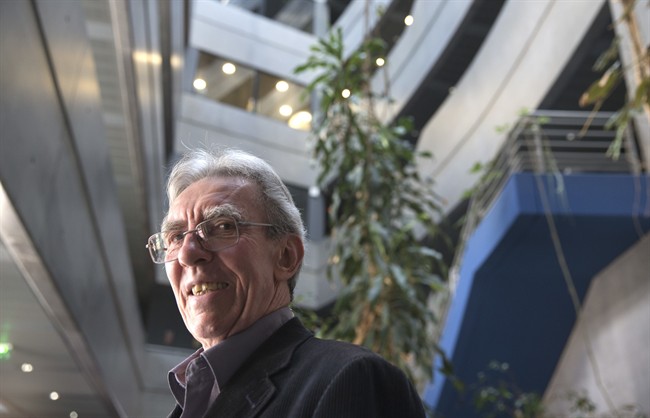STOCKHOLM (AP) — Three scientists won the Nobel Prize in chemistry on Wednesday for developing the world’s smallest machines, 1,000 times thinner than a human hair but with the potential to revolutionize computer and energy systems.

Frenchman Jean-Pierre Sauvage, Scottish-born Fraser Stoddart and Dutch scientist Bernard “Ben” Feringa share the 8 million kronor (USD$930,000) prize for the “design and synthesis of molecular machines,” the Royal Swedish Academy of Sciences said.
READ MORE: 3 scientists share Nobel Prize in physics for topology work
Machines at the molecular level have taken chemistry to a new dimension and “will most likely be used in the development of things such as new materials, sensors and energy storage systems,” the academy said.
Practical applications are still far away — the academy said molecular motors are at the same stage that electrical motors were in the first half of the 19th century — but the potential is huge.
Stoddart, 74, a chemistry professor at Northwestern University in Evanston, Illinois, has already developed a molecule-based computer chip with 20 kB memory. Researchers believe chips so small may revolutionize computer technology the way silicon-based transistors once did.
Feringa, a professor of organic chemistry at the University of Groningen, the Netherlands, leads a research group that in 2011 built a “nanocar,” a minuscule vehicle with four molecular motors as wheels.
Sauvage is professor emeritus at the University of Strasbourg and director of research emeritus at France’s National Center for Scientific Research.
WATCH: Physicist uses different kinds of pastries to explain the work which won Nobel prize in physics

The academy said the laureates’ work has inspired other researchers to build increasingly advanced molecular machinery, including a robot that can grasp and connect amino acids, the building blocks of proteins. Researchers are also hoping to develop a new kind of battery using this technology.
“I feel a little bit like the Wright brothers, who were flying 100 years ago for the first time and then people were saying ‘why do we need a flying machine?'” Feringa, 65, told reporters in Stockholm by phone.
“And now we have a Boeing 747 and an Airbus. So that is a bit how I feel.”
Speaking to French TV channel itele, Sauvage, 71, called the news a memorable moment and a big surprise.
“I have won many prizes, but the Nobel Prize is something very special. It’s the most prestigious prize, the one most scientists don’t even dare to dream of in their wildest dreams,” he said.
Stoddart’s daughter Alison said he was “absolutely ecstatic” at the honour.
READ MORE: Japanese scientist Yoshinori Ohsumi wins Nobel Prize in medicine
Molecular machines are molecules with controllable movements, which can perform a task when energy is added, the academy said.
Sauvage made the first breakthrough in 1983 when he linked two ring-shaped molecules together to form a chain. Stoddart took the next step in 1991 by threading a molecular ring onto a molecular axle, while Feringa was the first to develop a molecular motor in 1999 when he got a molecular rotor blade to spin continuously in the same direction.
The academy said the “miniaturization of machines” is just in its initial phase, with potentially “thrilling” developments ahead.
“The molecular motor is at the same stage as the electric motor was in the 1830s, when scientists displayed various spinning cranks and wheels, unaware that they would lead to electric trains, washing machines, fans and food processors,” the academy said.
Feringa said he could think of all kinds of potential applications, including smart materials that adapt to external conditions or “tiny robots that the doctors in the future will inject in your blood veins and then go to search for a cancer cell or … deliver a drug.”
WATCH: Ig Nobels—Scientists win for putting pants on rats and other weird science experiments

The chemistry prize was the last of this year’s science awards. The medicine prize went to a Japanese biologist who discovered the process by which a cell breaks down and recycles content. The physics prize was shared by three British-born scientists for theoretical discoveries that shed light on strange states of matter.
The Nobel Peace Prize will be announced on Friday, and the economics and literature awards will be announced next week.
The Nobel Prizes will be handed out at ceremonies in Stockholm and Oslo on Dec. 10, the anniversary of prize founder Alfred Nobel’s death in 1896.
Nobel, the inventor of dynamite, wanted his awards to honour achievements that delivered the “greatest benefit to mankind.”
—Keith Moore in Stockholm, Samuel Petrequin in Paris and Malcolm Ritter in New York contributed to this report.
- Ontario First Nation declares state of emergency amid skyrocketing benzene levels
- Do Canadians have an appetite for electric vehicles? Experts are divided
- Invasive strep: ‘Don’t wait’ to seek care, N.S. woman warns on long road to recovery
- Singh mulls TikTok return as U.S. nears potential ban over security fears




Comments